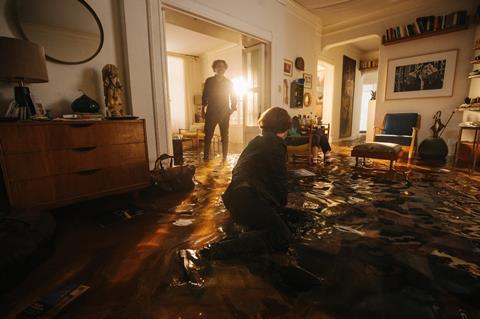
Alejandro Gonzalez Iñárritu saluted Netflix for ensuring his latest film Bardo, False Chronicle Of A Handful Of Truths would have a global theatrical rollout.
“The incredible thing is that now this film will be all over the theatres in Mexico and all over the world including in the US and in Spanish-speaking territories for seven weeks, and this is without precedent,” Iñárritu said at the film’s press conference at the Venice Film Festival. “I believe this is a film that really belongs in this space.”
Bardo opens theatrically in Mexico on October 27, after which it will be screened in cinemas in the US, Spain and Argentina on November 4 prior to a global rollout on November 18. The film will stream on Netflix on December 16.
The film is a nostalgic comedy that follows a renowned journalist and documentary filmmaker trying to come to terms with his own identity and complex family history upon returning to his native Mexico.
It stars Daniel Jimenez Cacho and Griselda Siciliani and marks the first time Iñárritu has shot a feature in Mexico since 2010’s Biutiful, which filmed in Mexico and Spain, and the first time he has shot a film entirely in Mexico since his 2000 breakout Amores Perros.
Iñárritu, a two-time best director Oscar winner for The Revenant and Birdman, said the film resonates with his own personal experience of returning to Mexico after having moved to Los Angeles with his family in September 2001.
“Mexico is not a country, it is a mental state. Every country, every nation, they are all mental states made up of our history there and of our experiences there, as well as of the stories you are told whilst you are there. And when you put some distance between you, they melt away,” the director said.
Iñárritu brushed away any concerns raised during the press conference about the effect streamers may have on the cinema industry, saying he was appreciative of the freedom he had received from Netflix in the production process. He added that it was “a great gift for people all over to be able to see it and live a cinematographic experience.”
Iñárritu drew a parallel with his film student days, when he had limited access to cinema screenings and spent most of his time viewing films on television screens.
“I would see all these absolutely great people on television, Bergman, Bunuel, Fellini, in actual fact by using a VHS with images of very bad quality. Now, instead, it’s all going in the direction of phones,” the director said. “What actually survives, however, is the idea.”







![The Brightest SunScreen[Courtesy HKIFF]](https://d1nslcd7m2225b.cloudfront.net/Pictures/274x183/3/5/0/1448350_thebrightestsunscreencourtesyhkiff_312678.jpg)

















No comments yet